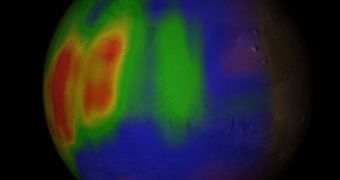Over the past couple of years, as vast amounts of scientific data on the Red Planet became available to research groups, scientists were overjoyed at noticing traces of methane on the surface of our neighbor. This was important because it implied biological sources – such as decomposing organisms – could have emitted it, and therefore the chances of finding it increased. However, just like everyone was in a frenzy on finding life, a new study comes to show that the enthusiasm may have been misplaced. It also shows that the gas is behaving in ways that are not associable with a biological origin.
The new research sheds a lot of question marks on the assertion that Mars was inhabited in the past, or that it may still be so now. In the paper, published today in the respected scientific journal Nature, scientists argue that the methane in the Martian atmosphere may have other possible explanations. The main objection to the growing optimism states that the methane concentrations thus far discovered are almost entirely distributed over a single region on the planet.
Researchers say that, regardless of the source of the gas, it should have spread more uniformly throughout the atmosphere by now, as any gas would. The investigation was led by chemists Franck Lefavre and Francois Forget, both from Universite Pierre et Marie Curie, in Paris, France, ScienceNow informs.
According to the team, the only explanation for this would be that chemical reactions taking place in the atmosphere are destroying the gas before it has a chance to spread. The reason why this find is so negative is the fact that, if such reactions indeed occur, then this would imply that they have the ability to destroy life as well. Methane is largely made up of the same chemicals that set the basis for life as we know it. Therefore, if certain agents in the air can destroy it, they could very well destroy organic material too.
“Something is rapidly destroying the methane in the Martian atmosphere. “There's no way life could survive at or near the surface if [methane] destruction occurred so quickly,” says Michael Mischna, who is a planetary scientist at the Jet Propulsion Laboratory (JPL), in Pasadena, California, where the control center for the Mars Exploration Rovers Spirit and Opportunity is also located. Harvard University planetary scientist Itay Halevy also agrees with this statement, saying that the methane destruction phenomenon is a “disturbing" discovery, with far-reaching implications.

 14 DAY TRIAL //
14 DAY TRIAL //